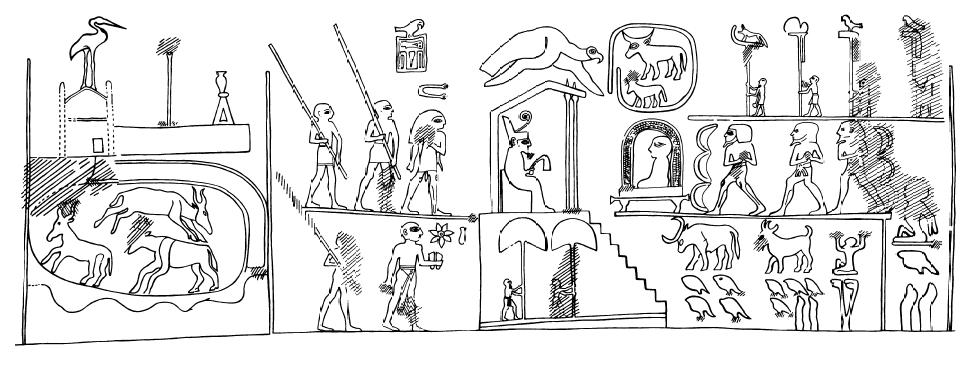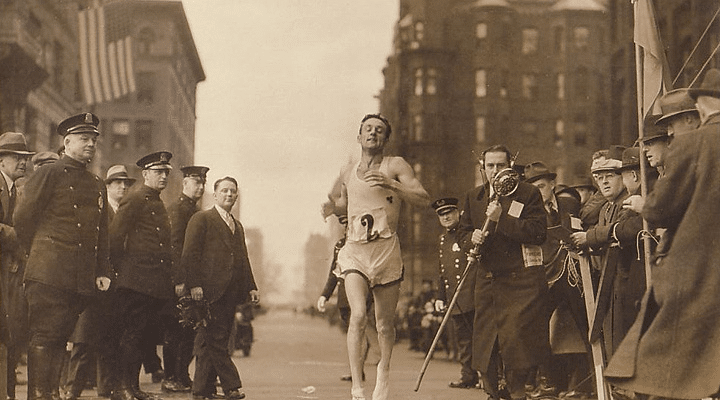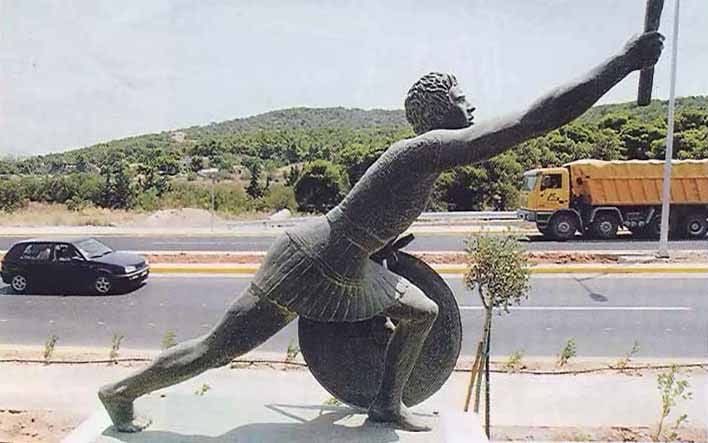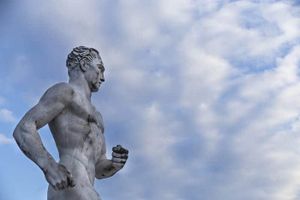You may have heard the story of how running was invented. It goes like this: A man was chased by a lion and he ran away. Other people saw this and they learned to run. And so, running was invented.
If you type “when was running invented” Google may deliver results saying running was officially invented in 1784 by Thomas Running. I suspect the millions of people who lived before 1784 probably wonder what they were doing when they were using their legs to go faster than a walk.
At any rate, we’re confident that prehistoric man, just like today’s runners, ran to catch prey and escape predators. Perhaps that is when running was invented.
The history of running as a sport, however, is different from the history of humans running. Humans are born to run. We have been doing it for millions of years and will probably continue to do so for millions more. But when did we start to organize races? When did those races become competitive? And what makes today’s races different from the races of yesterday?
Invention of Running
The most important thing you need to know about running is that it’s not something we invented. It’s something our bodies evolved to do over millions of years. Running can be traced back to our ancestors, who were likely primates that used their legs to travel long distances on the ground.
Running was discovered. It was the natural way in which early humans moved around, and thus there was no need for an invention or discovery of running; however, this changed with the advent of transportation and other means of movement such as horses, cars and trains.
The ancient Egyptians, Greeks and Romans also ran, as evidenced by drawings on cave walls and old pottery. The Greeks even had an Olympic Games with a variety of running events. In 776 B.C., the first Olympic Games included only one event — a short sprint called the stade race. It was the only event held at the next 11 games and by 724 B.C., two more events were added: the diaulos (two stades or about 400 meters) and the dolichos (approximately 20 stades or 3,200 meters).
Brief History of Running as a Competition and as Recreational Activity
The history of running dates back to the earliest form of human life on Earth. Running is a popular sport and recreational activity, with participants in running clubs, groups and races all over the world. Running has been described as the world’s most accessible sport.
In early 3100 B.C., the ancient Egyptians used to have a festival known as the Sed festival. This festival which is also called Heb Sed used to have massive gatherings which celebrated the Pharaoh’s continued rule. Running was a symbol used and it is assumed that means running was a thing.

The first recorded marathon was held in Athens at the 1896 Summer Olympics, the brainchild of Michel Bréal and Pierre de Coubertin after a suggestion by Greek poet Kostis Palamas. The modern Olympic Games were founded in 1894.
The word ‘athlete’ derives from ‘Athlos’, which describes an ancient Greek contest consisting of running, jumping, discus and javelin throws, and wrestling. Runners competed in races for distances up to 200 miles (320 km), usually without shoes or other equipment.
In 648 BC, Pheidippides ran from Marathon to Athens to deliver news of a military victory against Persia. Later, he ran from Athens to Sparta before his famous run from the site of the Battle of Marathon back to Athens for a victory celebration. The distance between Marathon and Athens is approximately 26 miles (42 km). Pheidippides died shortly after arriving in Athens with news of victory against the Persians at the Battle of Marathon.
Running for recreation and fitness
Later, we began running in informal races and during team practices just to enjoy the health benefits that come with running: weight loss and maintenance, stress relief, improved cardiovascular health, and mood enhancement, among others.
Today, we use running as a tool to improve our overall health and well-being and to promote longevity, not just to survive or compete!
When Was Running Invented as Sport?
Running, as an organized sport, began in England. The first organized competition was a race held at the University of Cambridge in 1828, and the first running club was formed in London in 1839. The first modern Olympics in 1896 included a marathon run from Marathon, Greece to Athens.
The movie Chariots of Fire gives some insight into how running as a sport was treated in the first half of the 1900s. “Some people create with words or with music or with a brush and paints,” wrote Eric Liddell, the Olympic champion portrayed in the film. “I like to make something beautiful when I run. What I must do is all that concerns me, not what the people think.”
The movie gives an idea of how running was treated as a sport in that era. Races were something that happened on the track or over a set course. There was no organized training regimen or pace coaching. For many though, running wasn’t considered a sport at all. It was just something people did if they couldn’t make their team in any other sport.
How did Running Become a Professional Sport?
The sport of running took off in the 1960s and 1970s, with great athletes like Jim Ryun and Steve Prefontaine becoming household names.
Eventually, running became a profession for some people. The Boston marathon almost lost its stature because it refused to pay the top athletes. Runners like Bill Rodgers helped bring the professionalism of long-distance running.
Today, professional runners are sponsored by major companies like Nike and Adidas, who provide them with shoes and apparel in exchange for wearing their brand on their uniforms during races. Professional runners also earn huge paychecks from winning races like the Boston Marathon and New York City Marathon, which both offer an over $1 million purse for top finishers!

The Marathon: An Origin Story
The most famous distance to run is a marathon. The word “marathon” comes from the town of Marathon in Greece, where a messenger ran 25 miles from the battlefield at Marathon to Athens in 490 B.C. to bring news of the defeat of the Persians by the Greeks. He reportedly shouted, “Rejoice! We conquer,” and then died on the spot! The marathon was instituted as an Olympic event for men in 1896 and for women in 1984. It quickly became one of the most popular events in the Olympics, and thousands of runners around the world try to qualify for the Olympics every four years. Unfortunately, some marathoners have suffered heat exhaustion and death due to hot weather conditions or inadequate preparation for a specific racecourse.

In ancient times, running was not a sport but was instead a form of military training or an ordeal meant to prove courage and strength or used as punishment or torture! Early long-distance races were also used by tribes such as Native Americans to test endurance after reaching puberty. There are accounts of long-distance running being used by Aztec warriors before battle or as punishment during Spanish conquests in Mexico during the 15th century AD.
Running for Fun and for Health
It’s hard to say exactly when running became a way of exercising. It has been around for a long time as a form of training for athletes, but since the 1970s and 80s, there was a running boom when people who were not runners started to run or jog for exercise, to get healthy, and gain physical fitness.
Running is one of the most popular ways to exercise today, and it continues to grow. There are marathons in every city throughout the world, and hundreds of thousands of people participate in races every month, from 5K races all the way up to ultra-marathon distances.
Running is Very Popular in the Covid/Post Covid World
Although some races have been canceled and others are being modified, the sport of running is not dead. It seems that more people are taking up the sport during Covid because they have time to train, and local races have seen a spike in registration.
But, why? Why would anyone want to run a race now when the results won’t be “real?” The answer is because they don’t care about that. They just want to finish a distance they’ve never done before.
Maybe you know someone who signed up for a virtual race this year — or maybe you did yourself. If so, you probably heard all sorts of questions from other runners who simply couldn’t understand why anyone would want to do a virtual race:
Why wouldn’t you just wait until next year?
Won’t it be boring without other runners?
Is it even going to count?
You might have heard that last one from your non-running friends and family, who can’t see how you could ever accomplish anything on your own and still call it a victory.
What Was Running Called Before It Was Invented?
Before its official invention, running was a means of delivering messages faster. Again, it was a way of saving oneself from danger, especially among the Australopithecus who had to save their lives from predators.
What Year Was Running Invented?
Was running really invented in 1748? Many manuscripts claim that running Thomas Running invented running in 1748 when he tried to walk twice the same time. However, we can trace running as far as human history itself.
Who Invented Running?
No one particular person invented running. Running is something that has been inherent within the capabilities of human beings, just like jumping or walking. It dates back to the Greeks, Egyptians, and Persians of the ancient world.
How Was Running Invented?
Human ancestors invented running out of the necessity to hunt wild animals. This dates back as far as human history itself. The Australopithecus also had to run to save their lives from predators who were chasing them. On the other hand, competitive racing was birthed from religious festivals.



Join the conversation